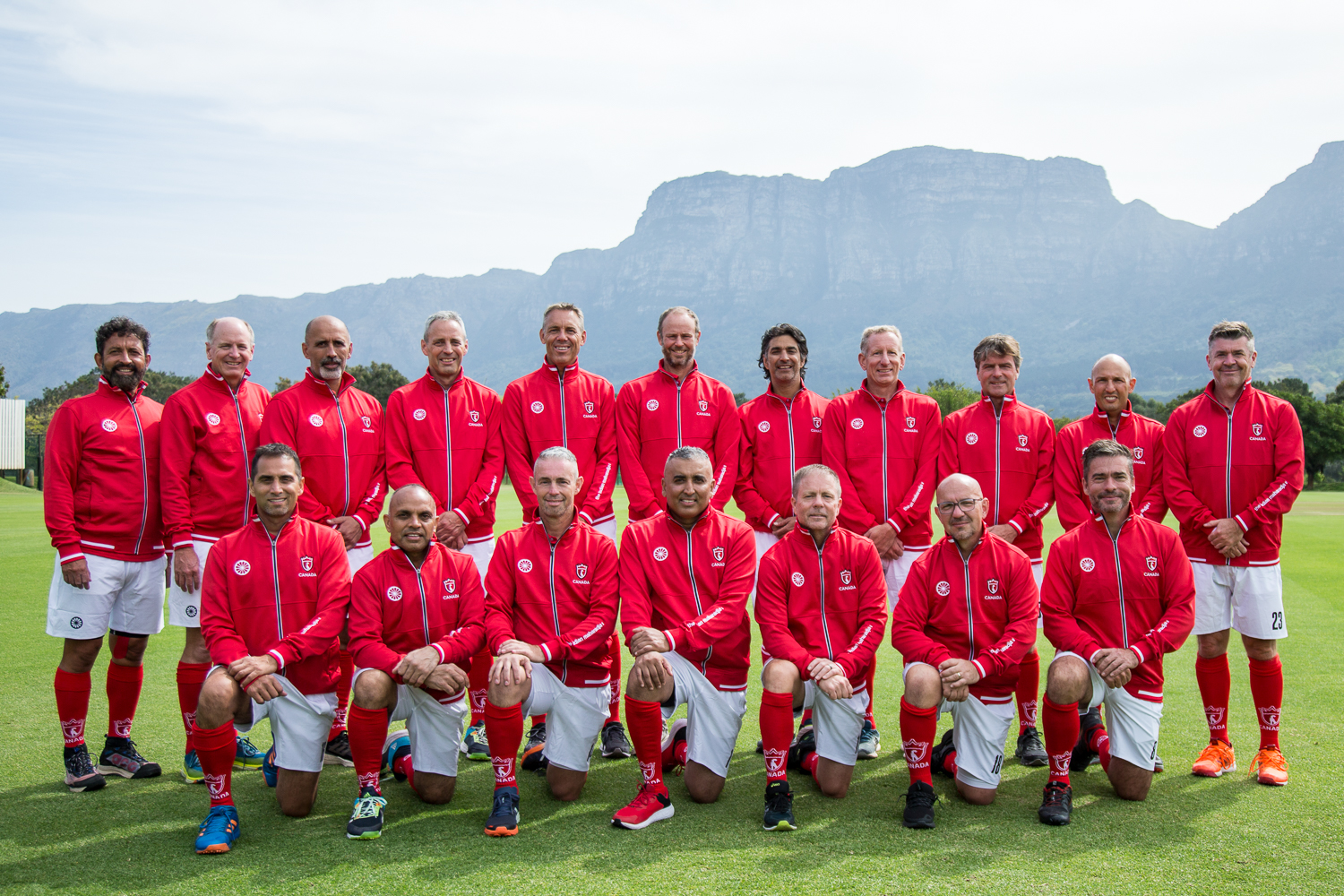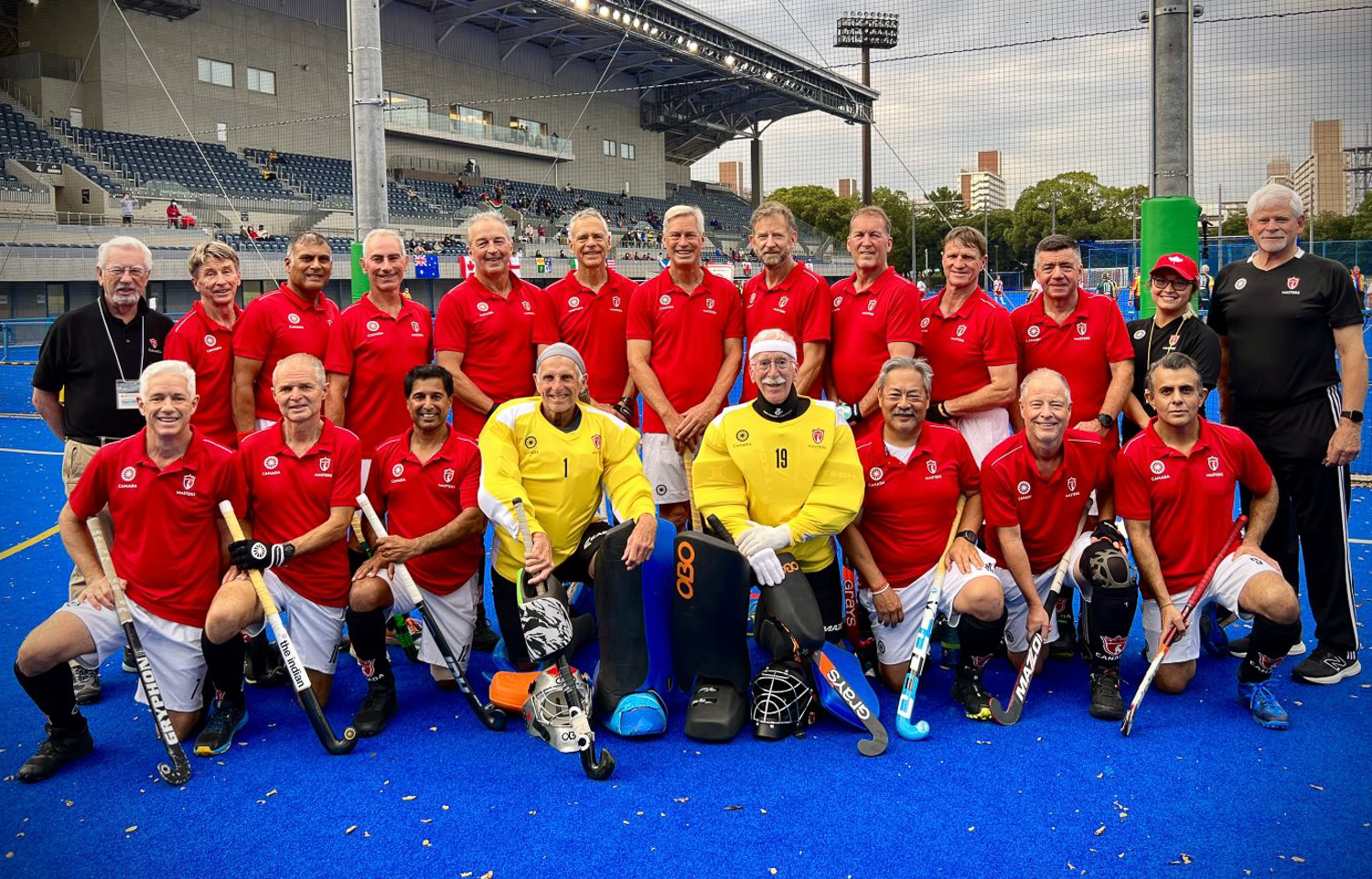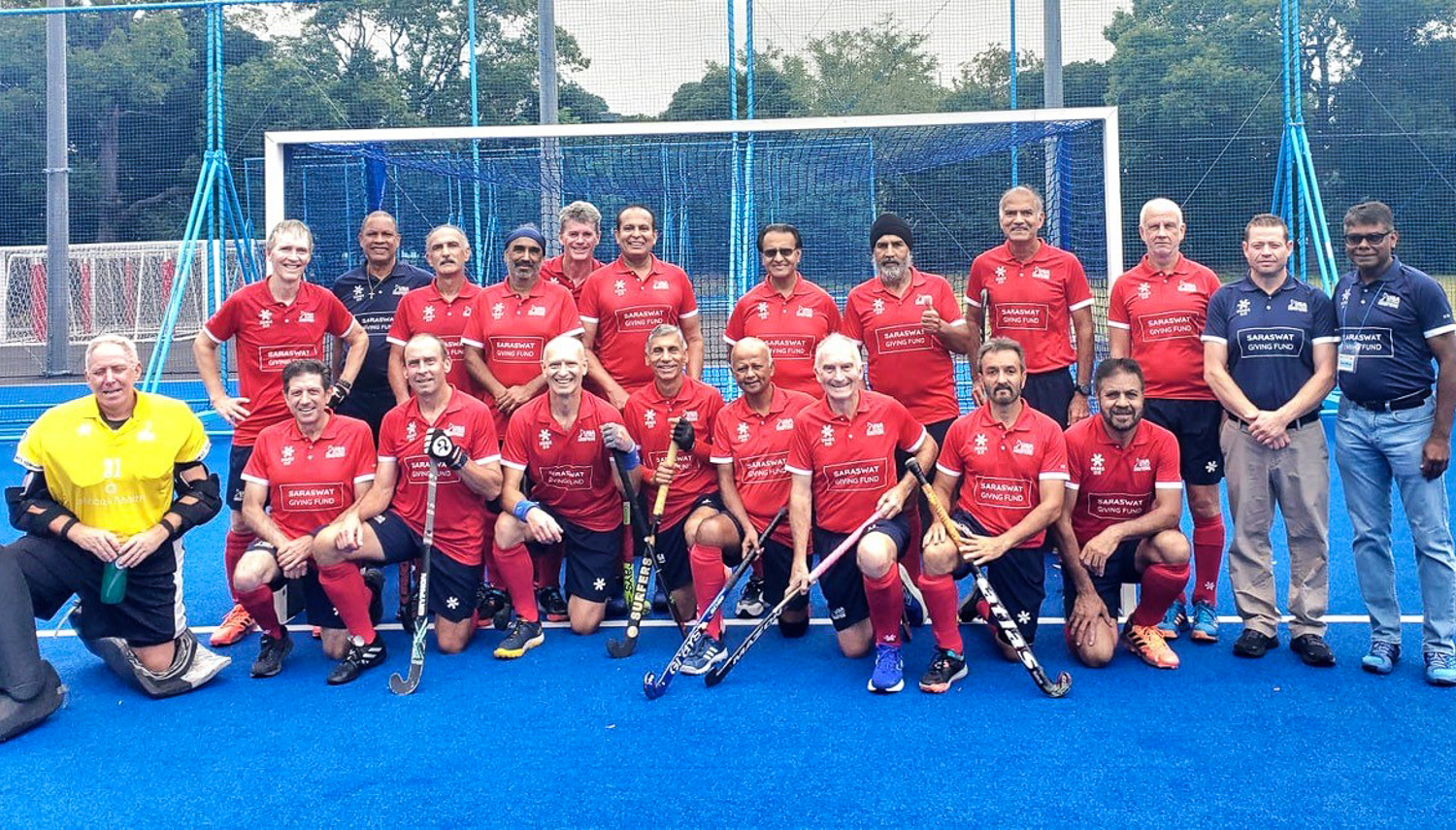
On the World Masters Hockey website there is a picture of two players, Billy Taylor from Scotland, Darryl Michael from USA. They were both playing in the Over 65s Men’s World Cup in Japan. The two players were celebrating more than just a hockey tournament because in 2018 Taylor saved the USA player’s life when he suffered a heart attack while pitch side. The Scottish player carried out CPR for more than 40 minutes as they waited for the ambulance to arrive. Four years later and following a quadruple bypass, Michael was back representing USA.
This is just one story of friendships that have endured time and distance. It is just one story among many, many stories that were recounted as three Masters World Cup events took place in England, South Africa and Japan, with teams from the Pan American Hockey Federation represented at all three events.
In Nottingham, England, the men’s O35 and O40 and the women’s O35 and O40 competed in two fiercely contested events. Argentina men finished in 4th place, just out of the medals in the O35 event, while in the O40, USA men finished 8th, with Argentina two places lower in 10th position.
Argentina women O40 took a well-deserved silver medal as they were defeated 2-0 by the host nation England. The USA team finished 7th after defeating Wales in the final match by a shoot-out. In the O35, USA were 5th with Argentina in 7th position.
| Men’s O35: https://masters.altiusrt.com/competitions/181 |
| Men’s O40: https://masters.altiusrt.com/competitions/182 |
|
Women’s O35: https://masters.altiusrt.com/competitions/178 |
| Women’s O40: https://masters.altiusrt.com/competitions/179 |
Chile’s Veronica Planella, competed for Chile O55 women. She said of the experience: ‘It was truly inspiring and showcased the commitment to the game of hockey by players at every level.’
The O60 event resulted in another medal for Argentina women as they beat the Netherlands to win the bronze medal. USA finished in 7th place in the same competition.
The PAHF men’s teams in Cape Town weren’t able to add to the medal haul. The O50 saw Argentina finish the tournament in 7th place, with Canada in 9th and USA in 10th. In the O55, Argentina were placed 8th, with USA in 10th place and in the O45, Argentina finished in 8th position, one place ahead of the USA in 9th.
‘Organizing this tournament took much longer than I expected. I was already over 80 when I first got involved, and I didn’t expect the preparations to continue for such a long time (due to the double-postponement). But I’m pleased to say that we have managed to finish the tournament without much trouble. And I’m glad that the participants were very pleased with it too. This was a very nice opportunity for older players to get together and reconfirm their friendships.’
In the O60 category, Canada ended the tournament in 5th position, with USA in 8th place. The USA were the sole PAHF representatives in the O65 and captain Alva Serrette led his team to a 6th place finish.
| Men O60: https://masters.altiusrt.com/competitions/201 |
| Men O65: https://masters.altiusrt.com/competitions/202 |
In another nostalgia-inducing moment, the Technical Delegate TD Sana Kiyoshi of Japan and Assistant Umpire Manager Alan Waterman of Canada umpired an O70 game together at the World Cup. The last time they umpired in tandem, was 30 years ago at the 1992 Barcelona Olympics. Alan revealed that he even used the same whistle and cards!
Also representing PAHF as an umpire was Canadian umpire Denise McGeachy. She was officiating at the Women’s Masters World Cup in Cape Town and was blown away by the experience.
‘The Masters World Cup was unlike any umpiring experience I had in Canada. The quality of play was outstanding and the opportunity to umpire with, and learn from, the other umpires and umpire managers was a very enriching and positive experience. I also got to experience the MWC with my spouse (who played for Canada O50 Men) and several friends, which made it all the more enjoyable.’
Speaking to players from across the world, the overwhelming reaction to the trio events was one of camaraderie. Athletes, coaches and umpires were so happy to be back playing with and against the people they had met over a lifetime of hockey involvement.
USA O60 goalkeeper Jon O'Haire, who played for the USA senior team from 1982 to 1995, said: ‘Early on in my hockey playing career I was given an advertising sticker that read - “Hockey. Life, Be in it”. Forty years later, I've found truer words were never written’.
Ohaire is an old hand at Masters hockey too. He had competed in the previous two Masters Outdoor World Cups as well as the most recent Masters Indoor World Cup.
‘Hockey has provided me with an opportunity to play for the last four decades,’ he says. ‘While my game has changed over the years, my passion for play hasn't diminished. I love the chance to be a part of a team and to see what we can accomplish as a group in a competitive environment.
‘In the US, men's hockey pales in numbers in comparison with the women. I like to think what we lack in quantity, we make up for in passion and diversity. Our melting pot of a team featured players from England, India, Kenya, Netherlands, Pakistan and the United States with an equally varied range of playing experiences. The World Cup provided us an amazing opportunity to measure ourselves against opposition of our own age from across the world.’
And O'Haire adds that while each and every match is contested with the same pride and ferocity as it ever has been, the ability to take a loss as well as celebrate a win has become more evident.
‘Don't get me wrong,’ he says. ‘We all play to win, but I've found how you play, compete and ultimately win or lose, is equally important. In finishing eighth in our competition, unfortunately we found more than we would have liked about losing, but I'd like to think we earned a lot of respect in how we competed.
‘One of the moments that stayed with me from Tokyo happened when we first got off the plane. We were in the throng of humanity at Customs and as the line snaked around to Immigration Officers we saw a group across the hall wearing Canada baseball caps. I heard a call across the lines, "Jon, how are you?" We were all wearing COVID masks and as I tried to puzzle together who it was, it dawned on me. It was Bubli Chohan! The last time I saw Bubli was in 1995 on the playing fields in Argentina.’
Paul Chohan – known across the hockey world as “Bubli” – is a renowned star of Canada field hockey. He earned 317 Caps playing for his country and played in three Olympic Games (1976 Montreal, 1984 Los Angeles and 1988 Seoul); three World Cups (1978 Buenos Aires, 1986 London and 1990 Lahore) and six Pan American Games (1975, 1979, 1983, 1987, 1991 and 1995).
For Bubli, like so many of the friends and rivals who reunited over Masters Hockey, the motivation to keep playing the game was two-fold.
‘My motivation for competing was I wanted to recapture the feeling that I had when I was playing on the national team and to represent Canada again. The bonus was that I met up with some of the players that I played against and the rivalry was definitely there but, in this tournament, we could have a beer together after the game and chat about the game.’
Bubli admits that he has slowed down but adds that he now calls on his playing experience rather than speed to outwit his rivals. What is obvious is that none of the players have lost their drive to be competitive.
‘There are plenty of mature players out there in the world who need a place to compete and that’s why this type of tournament is so important,’ added Bubli.
Wendy Stewart (Canada), who umpires at the highest level of the international game, was a competitor in the Spirit of Masters team in Cape Town. This was a team that comprised players from across the world. She agrees with Jon and Bubli that there is so much good – physically and mentally – about continuing to play for as long as the body can hold up to the challenge.
‘It’s hard at times because as a competitor I want to perform at my best all the time. However, survival is key when you are playing in a tournament environment. In Cape Town I played seven matches in ten days, which definitely takes its toll. So I should sensibly find the balance to know when to pace myself and inevitably be more efficient and smarter in each game and with my aim to finish the tournament unscathed and one piece. It doesn’t always happen!
‘It’s definitely a sport for life. The desire to keep being fit and active into my advanced years also ticks that box, followed by the wonderful friendships and connections that I’ve made over the years and continue to do so because those amazing people and shared experiences are special and unique. The opportunity to travel and play in incredible locations and experience other cultures ignites that spark for me.’
For Wendy, the challenge of stepping onto the pitch to play alongside team mates that she had only met hours before added to the familiar match day adrenaline she experienced as an international umpire.
‘When I was umpiring, I faced some similar situations. A lot of time is spent preparing individually and then, when you meet with your colleagues, some you will have previously known and with others it’s the first encounter. However as with any team playing or umpiring, the objective to feel proud and strive to be worthy of your place, be inclusive, adaptable, supportive and encouraging factors heavily.’
Getting these events off the ground has taken a lot of hard work by the organizers and the teams. Particularly when considering the delays due to Covid and the financial challenge of getting the teams to their events – in most cases the teams are self-funded.
But, like Bubli, Wendy Steward is in no doubt about the importance of such events.
‘Without a doubt playing hockey at any age provides a sense of achievement, whether it’s to develop your skills, keep active, become fitter to maintain a healthy lifestyle or just to socialize with your team and the opposition, being part of any hockey community is very beneficial. The opportunities to participate locally, at a tournament or go on tour is an extraordinary experience that can offer such amazing camaraderie and lifelong friendships. If you get the chance to play – make it happen.’
And she signs off with a sentiment that echoes with many of the players who took to the field in England, South Africa and Japan: ‘Wow what a community to be involved with and they say growing old sucks!! - well I completely disagree.’



